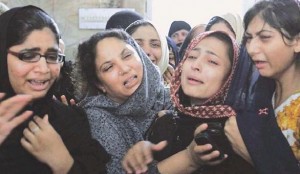The Case of Sarfaraz Shah: Has Justice Been Done?
 Overwhelmed, the brother of Sarfaraz Shah promptly declared that “justice has been done” when the Anti-Terrorism Court recently sentenced Rangers officer Shahid Zafar to death by hanging and a fine of Rs200,000 for the murder of 21-year-old Shah on June 8. Life imprisonment sentences were meted out to five other accused paramilitary accomplices and a civilian private contractor who pointed the finger at Shah for robbery. Judge Bashir Ahmed Khoso also decided that each of the six must pay Shah’s family Rs100,000. But the battle for retribution for Sarfaraz Shah’s family is not over.
Overwhelmed, the brother of Sarfaraz Shah promptly declared that “justice has been done” when the Anti-Terrorism Court recently sentenced Rangers officer Shahid Zafar to death by hanging and a fine of Rs200,000 for the murder of 21-year-old Shah on June 8. Life imprisonment sentences were meted out to five other accused paramilitary accomplices and a civilian private contractor who pointed the finger at Shah for robbery. Judge Bashir Ahmed Khoso also decided that each of the six must pay Shah’s family Rs100,000. But the battle for retribution for Sarfaraz Shah’s family is not over.
It has since been affirmed that this verdict will be appealed in the Sindh High Court by the defence counsel, based on procedural and legal specificities in the case that have yet to be exhausted.
Significant attention has been paid to the case across the country, and demands for justice have been loud, organised and ubiquitous. The live video coverage aired on local TV channels and websites of Sarfaraz Shah begging for his life after being shot twice and then left supine on the street evidently disturbed the nation. Shah’s family believes that the Supreme Court’s taking suo moto notice of the incident and initiating investigations, on the heels of a nationwide outcry, is what led to their victory in the courts.
But public consciousness in Pakistan is capricious at best. And in situations where a mass public outcry has not dogged them, law enforcers have not exactly instilled confidence in the people. The bestial murder of Salmaan Taseer by his own bodyguard, elite force commando Mumtaz Qadri, was met with celebrations in some quarters and a chilling quiet at large. While Qadri was garlanded as a hero, Salmaan Taseer’s family still awaits justice.
Investigations into another case in May — of five unarmed Chechens, among them a pregnant woman, on whom FC personnel opened indiscriminate fire in Kharotabad — have confirmed that injustice was done. Though it is now known that the foreigners were not innocent and they may have had terrorist training, they were unarmed at the time and hence explanations defending the brazen and excessive gunfire only makes for derisory excuses. Little surprise that some now fear that firearms issued for the protection of civilians may actually endanger the public.
The charge against the Rangers in Sarfaraz Shah’s murder read that the killing spread terror and created a sense of insecurity in the public, and hence fell under the Anti-Terrorism Act of 1997. But the seven men charged are not the only law enforcers who might be disregarding the Act on a daily basis. Unless the public and courts are unequivocal in their condemnation of all acts of violence, fear and insecurity will continue to haunt our streets.
Maheen Bashir Adamjee is an APNS award-winning journalist. She was an editorial assistant at Newsline from 2010-2011.



